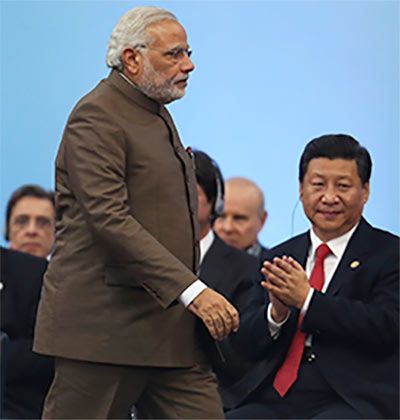 On the eve of President Xi Jinping’s India visit, China on Friday stuck to its guns saying that there was no change in its stand on India’s Nuclear Suppliers Group membership bid and New Delhi’s attempts to get Jaish-e-Mohammad chief Masood Azhar designated as a terrorist by the United Nations.
On the eve of President Xi Jinping’s India visit, China on Friday stuck to its guns saying that there was no change in its stand on India’s Nuclear Suppliers Group membership bid and New Delhi’s attempts to get Jaish-e-Mohammad chief Masood Azhar designated as a terrorist by the United Nations.
As Xi is due to arrive in Goa on Saturday to take part in the BRICS Summit, Chinese foreign ministry spokesperson Geng Shuang said the relations between India and China made “great headway” despite some “disputes” but there was no change in in Beijing’s stand on the issues of NSG and Azhar.
“I have stated China’s position. I would like to reiterate that the UN committee dealing with the listing does it according to provisions of the UN charter,” he said while replying to a question on India’s application to ban Azhar following the Pathankot terrorist attack.
Geng, at a briefing, said China maintains that 1267 Committee of the UN designated to ban terrorist outfits should work on true facts and make a decision according to consensus of its members.
All parties are divided in listing of the relevant people. And this is why China has put on hold banning Azhar, he said.
The second technical hold put by China will give enough time to make the listing decision, Geng said, adding that this also shows the responsible and professional attitude of the Chinese side.
“China’s position has not changed regarding the joining of the NSG by India,” Geng said.
Speaking on the same issue earlier this month, China’s Vice Foreign Minister Li Baodong had harped on the need to build consensus over the admission of new members in the 48-member NSG.
Geng said on Friday that he wants to “underscore” that in recent years China and India relations had been making “great headway” despite some “disputes”.
He said that the “mainstream of bilateral relations have been positive” and “cooperation far outweighs competition”.
Geng expressed hope that the two countries can continue with dialogue and cooperation to exchange views on some disputes, seek solutions and properly manage relevant disputes.
Meanwhile, a Chinese scholar, Hu Shisheng, Director of the China Institutes of Contemporary International Relations affiliated to the Chinese foreign ministry, said China may speed up the construction of the $46 billion China-Pakistan Economic Corridor which passes through Pakistan-occupied Kashmir if Pakistan is isolated and cornered by India.
“China has to discuss with Pakistan about the current situation on how to handle and how to come out it,” Hu said speaking about Pakistan’s isolation in the region leading to the postponement of the SAARC summit after the Uri terror attack in which 19 Indian soldiers were killed.
“China has to further enhance relations with Pakistan if it feels cornered. A cornered regime some times will be more desperate, which will not be conducive to political development within Pakistan,” Hu said.
“If Pakistan feels isolated from South Asia, then China will speed up CPEC to instil confidence in Islamabad,” he said.
However, Hu said this isolation may be conducive for Pakistan to remove internal differences on CPEC. The isolation “may be to the good of CPEC”, he said.
“The completion of the CPEC, may give Pakistan some confidence in handling differences with India more confidently,” he said.
“This may also change the Pakistani mindset on extremism, radicalism and terrorism and shift (it) to development,” he said.
Hu said India is purposely promoting the regional sub-regional integration in South Asia to isolate Pakistan.
“This will make Pakistan feel cornered and improving relations with India (will be) more difficult,” he said.
With indefinite postponement of SAARC, a platform has been lost for India and Pakistan to improve relations, he said.
With postponement of SAARC Summit to be held in Pakistan there is no certainty whether the summit will be held and even it if it will be held, it will take several years, he stated.
On threats by Pakistan to create a greater South Asian Association of Regional Cooperation, Hu said he has not heard of such a proposal.
Even if Pakistan tries to create SAARC in its neighbourhood, involving Iran, China and Central Asian Republics, the real SAARC will be led by India where as Islamabad cannot be the leader in the organisation it plans to create, Hu opined.
Pakistan can only be part of such a grouping but not a leader because of other major powers, he said.
On Xi’s proposed meeting with Modi on the sidelines of the BRICS summit in Goa, he said top leaders alone cannot solve problems.
There has to be candid and frank talks at the diplomatic level which would enable top leaders to take decisions, hesaid.
“China can not sit idle like in the past to let India-Pakistan tensions grow. May be in future, China would like US to be more active with India and Pakistan to stabilise their relations,” Hu said.






 © 2025
© 2025